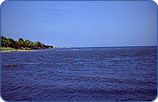 |
The Black Sea is widely recognized as one of the regional seas most damaged by human activity. Almost one third of the entire land area of continental Europe drains into this sea. It is an area, which includes major parts of seventeen countries, thirteen capital cities and some 160 million persons. The second, third and fourth major European rivers, the Danube, Dnieper and Don, discharge into this sea while its only connection to the world's oceans is the narrow Bosphorus Strait. The Bosphorus is as little as 70 meters deep and 700 meters wide but the depth of the Black Sea itself exceeds two kilometers in places. Contaminants and nutrients enter the Black Sea via river run-off mainly and by direct discharge from land-based sources. The management of the Black Sea itself is the shared responsibility of the six coastal countries: Bulgaria, Georgia, Romania, Russian Federation, Turkey, and Ukraine. |
 |
In a period of only three decades (1960's-1980's), the Black Sea has suffered the catastrophic degradation of a major part of its natural resources. Particularly acute problems have arisen as a result of pollution (notably from nutrients, fecal material, solid waste and oil), a catastrophic decline in commercial fish stocks, a severe decrease in tourism and an uncoordinated approach towards coastal zone management. Increased loads of nutrients from rivers and coastal sources caused an overproduction of phytoplankton leading to extensive eutrophication and often extremely low dissolved oxygen concentrations. The entire ecosystem began to collapse. This problem, coupled with pollution and irrational exploitation of fish stocks, started a sharp decline in fisheries resources. |
|
The transboundary nature of most of these problems, coupled with earlier political realities, was the main reason for the insufficiency of previous control measures. The problems themselves also have important extra-regional and global dimensions. One of the main factors in the decline of Black Sea fisheries has been the introduction of alien species, for example, the massive invasion of the Black Sea by a comb jelly, Mnemiopsis leidyi, which was probably accidentally introduced one decade ago in ship-borne ballast water from the eastern seaboard of America. Its presence in the Black Sea represents a threat to other regional seas. Similarly, quantities of persistent pollutants, such as "persistent organic pollutants", reach the Black Sea basin and reduction in their input to the Black Sea is an essential part of a global strategy to control them. Finally, the conservation of biodiversity in the Black Sea as well as the preservation of Black Sea habitats, vital for endangered migratory bird populations, has an important global significance. (source : BSERP: http://www.blacksea-environment.org) |






